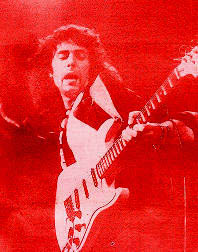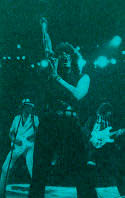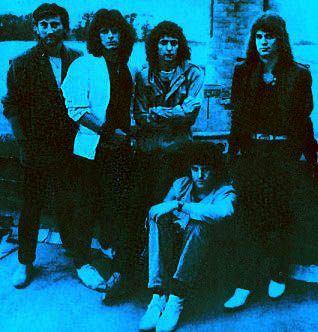|
Ritchie Blackmore Rainbow's End Simon Scott survives a meeting with RITCHIE BLACKMORE of RAINBOW  DALHOUSIE CASTLE, just outside Edinburgh, is the perfect venue to conduct an interview with Rainbow. It's not the modern comforts of this converted hotel that make it so attractive, or even its country location that means the band are assured plenty of peace and quiet in which to relax. The main attraction that enticed Ritchie Blackmore back for a second stay is its nonpaying guests ...
Dalhousie Castle is haunted!
DALHOUSIE CASTLE, just outside Edinburgh, is the perfect venue to conduct an interview with Rainbow. It's not the modern comforts of this converted hotel that make it so attractive, or even its country location that means the band are assured plenty of peace and quiet in which to relax. The main attraction that enticed Ritchie Blackmore back for a second stay is its nonpaying guests ...
Dalhousie Castle is haunted!As it turned out, the dark and secret castle was in perfect harmony with Blackmore's mood as the band returned after the first of two concerts at the city's Playhouse. They'd played a lousy gig, and the fact that it wasn't the band's fault did nothing to ease Ritchie's temper. Thanks to an obscure jobs worth invoking an equally obscure fire regulation, the band's mixing desk was evicted from its usual position at the rear of the stalls, and relocated on the first balcony. The result was that the engineer couldn't hear the band, who couldn't hear each other, so the crowd lost out with appalling sound. As the band drifted back into the hotel, their mood seemed to be resigned. Ritchie had explained the situation to manager Bruce Payne who politely but firmly informed the hall keepers of the latest situation. Either the desk returned to the stalls by the following night, or Rainbow did not play. You don't mess with managers like Bruce Payne, any more than you mess with guitarists like Ritchie Blackmore. The atmosphere as we settled down for the interview was fraught. We began tactfully: it had always seemed to me that Ritchie Blackmore was more than just another run-of-the-mill flash fantasy guitar hero; more of a master craftsman, in the Jan Akkerman or Roy Buchanan mould, perhaps.  "No not really, although Roy Buchanan can play quite well," decided Ritchie. "I'm a strange type of guitar player. I can play very well on some nights, and badly on others. I can be quite ostentatious on stage sometimes. As soon as someone tries to pin me down, I go the opposite rock is built around anger." He frowned at the at the memory of the night's abortive performance.
"No not really, although Roy Buchanan can play quite well," decided Ritchie. "I'm a strange type of guitar player. I can play very well on some nights, and badly on others. I can be quite ostentatious on stage sometimes. As soon as someone tries to pin me down, I go the opposite rock is built around anger." He frowned at the at the memory of the night's abortive performance."Tonight I was angry because the sound was so awful. When you're out there with all these people who've paid to see you, there isn't much you can do, so you have to pretend a lot. I find it hard to pretend that I'm having a good time on stage when I'm not." As Ritchie spoke, the atmosphere became charged with his bitter frustration, the side of this musician that the fans never see. It seemed he was exercising at least some of that frustration. "I go out on stage to please the audience," he continued. "But as soon as I hear bad sound, or wrong notes, I'm at odds with myself and I can't carry on. I become very introverted and very defensive, and then I go against the audience. All I want to do is stop and say, 'Don't clap because I'm really not playing very well. Let's stop and have a soundcheck, and then we'll start again and see if we can do it better.' But I can't do that. I go behind my amplifier and I'm talking on the intercom to the sound people, asking them what's wrong. "People think I'm being moody and throwing a tantrum, but I want to give the audience so much, that when I can only give them half, I take it out on them, and they get a very unprofessional attitude. They think 'What's he doing? He's behind his amp and now he's not going to play an encore, what sort of attitude is that when we've paid five pounds to see him?' But in fact I'm ashamed. I cut off my nose to spite my face. "I play badly and then I won't play encores because then I want to behave badly and throw tantrums, it's very unprofessional. I'll never be able to do the cabaret circuit around Manchester!" This was an unexpectedly long speech for a man who has long had a reputation for not talking to the press. "The press have to have a bad guy, and I don't mind being the bad guy," he admitted with a wry smile. "My favourite film was 'High Noon' and my hero was the bad guy, the man in black who rode into town to shoot Gary Cooper. I think I'm strong enough to be the bad guy, the one most people don't want to be. Who wants to be spoken about as they leave the room? I'm quite happy for people to talk about me as I leave the room, for them to say 'Oh he's this and he's that', because I know I can back it up with my guitar playing, and it gives me an edge to my playing." Blackmore's legendary truculence isn't, of course, restricted to the press. His relationships with record companies have been similarly tense.  "It's their attitude," Ritchie said. "The 'You are a product and you sell records therefore we are your friends, next year when you are nothing we will not talk to you.' I can never reconcile myself to all that so I just stand back and say 'Well you know I have a terrible reputation for not talking to people,' and they say 'Yes we didn't expect you to talk to the press for us because you are the awkward, irritable, miserable bastard we've heard about.' And I say 'Fine, well leave me alone then.' And they do, which suits me fine."
"It's their attitude," Ritchie said. "The 'You are a product and you sell records therefore we are your friends, next year when you are nothing we will not talk to you.' I can never reconcile myself to all that so I just stand back and say 'Well you know I have a terrible reputation for not talking to people,' and they say 'Yes we didn't expect you to talk to the press for us because you are the awkward, irritable, miserable bastard we've heard about.' And I say 'Fine, well leave me alone then.' And they do, which suits me fine."He makes it all sound so simple; so yet another myth concerning miserable bastards is shattered. For miserable, read serious and introvert, not irritable and awkward. "I'm just fond of my own company. I never answer the phone at home. My wife will always answer it and she makes up brilliant excuses why I can't come and talk to people. I don't talk on the phone because I feel that people are disturbing me just to talk a load of idle bullshit. "I like to think I'm living my life as something ... not above... just more rewarding than the usual nonsense that goes on in music." THE current Rainbow line-up is the one that recorded "Bent Out Of Shape", the latest album that's enjoying steady success in the States, although its been more cautiously received here. Mainly, the reviews were favourable, although at least one reviewer castigated Roger Glover's production, claiming that he'd diluted the band's sound to make their records more palatable for American radio. "That's entirely why I did it," Roger Glover will argue. "That's my job. To help the band to sell more records, and the way you sell more records is to break America, and the way you break America is to get played on American radio. "People say the band's gone soft, or gone commercial, that's bullshit. The band has survived." So how hard is it to produce Rainbow? "The producer's rule book has two rules in it," said Roger. "Number one, the producer is always right. Number two, even when he's wrong, he's right. Now in Rainbow, that rule applies to Ritchie." THE third man in the Rainbow front-line is vocalist Joe Lynn Turner who has stamped his own identity very firmly onto the last three Rainbow albums. "When I first joined it was very hard," Joe recalled, "people were shouting for Dio people like that. Now I feel that Ritchie has given me enough power and enough space to share the band with me and with the others. His attitude backs me all the way, he feels you should just go ahead and do what you want to, that's what he's done all his life." Joe may just have provided the mesmeric, maverick Blackmore with the most suitable epitaph for his career. © Simon Scott, Melody Maker - October 15, 1983 Photos: © Robert Ellis |